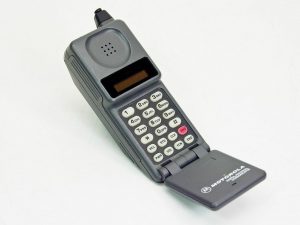I n today’s digital age, our smartphones have become an integral part of our lives, holding a wealth of personal information. Occasionally, we may encounter situations where a stranger asks to borrow our cellular phone for making a phone call. While the gesture may seem harmless, it is essential to understand the potential cybersecurity implications. In this article, we will explore the reasons why it is unwise to lend your phone to a stranger, emphasizing the significance of cybersecurity, and providing situational examples to illustrate the risks involved.
n today’s digital age, our smartphones have become an integral part of our lives, holding a wealth of personal information. Occasionally, we may encounter situations where a stranger asks to borrow our cellular phone for making a phone call. While the gesture may seem harmless, it is essential to understand the potential cybersecurity implications. In this article, we will explore the reasons why it is unwise to lend your phone to a stranger, emphasizing the significance of cybersecurity, and providing situational examples to illustrate the risks involved.
- Personal Data Breach:
Handing over your cellular phone to a stranger grants them access to your personal data, which could lead to severe consequences. For instance, imagine lending your phone to someone who claims they need to make an urgent call. Unbeknownst to you, they quickly browse through your photo gallery, accessing private images or videos that you intended to keep confidential. This breach of personal privacy can have long-lasting emotional and reputational repercussions.
- Malicious Application Installation:
When you lend your phone to a stranger, there is a risk of them installing malicious applications without your knowledge. For example, consider a scenario where someone requests to make a call from your device. While appearing to innocently browse your phone, they download and install a malicious app that enables remote access to your phone’s camera or microphone. This intrusion compromises your privacy, allowing unauthorized individuals to monitor your surroundings or conversations.
- Phishing and Social Engineering Attacks:
Lending your phone to a stranger presents an opportunity for social engineering attacks or phishing attempts. Suppose someone borrows your phone under the guise of making an important call. While using your device, they may access your email or messaging apps to gather sensitive information or manipulate you into divulging personal details. This deceptive practice can lead to identity theft, unauthorized access to financial accounts, or even the compromise of your social media profiles.
- Network Exploitation:
By lending your cellular phone, you unwittingly open the door for potential network exploitation. Picture a situation where someone asks to borrow your phone for a quick call, but they proceed to connect it to a compromised Wi-Fi network. This network may be designed to intercept data transmitted from your device, potentially exposing your login credentials, banking details, or other confidential information. Moreover, the attacker could also use your device to launch attacks on other devices connected to the same network.
- Unauthorized Account Access:
When you lend your phone, you risk giving a stranger access to your various online accounts. For instance, consider a situation where someone asks to borrow your phone for a few minutes and subsequently gains access to your email account. From there, they can reset passwords, access sensitive information, or even engage in malicious activities, jeopardizing your digital identity and potentially causing financial harm.
Conclusion:
Lending your cellular phone to a stranger, no matter how innocent it may seem, poses significant cybersecurity risks. The potential consequences range from breaches of personal data and installation of malicious applications to social engineering attacks and unauthorized account access. To protect our digital lives and safeguard our privacy, it is crucial to exercise caution and refrain from handing over our smartphones to strangers. By staying informed about cybersecurity risks and maintaining a vigilant approach, we can ensure our personal information remains secure and minimize the chances of falling victim to cyber threats.
When approached by a stranger requesting to use your cellular phone, it’s essential to prioritize your own safety and protect your personal information. Here are some plausible excuses you can use to politely decline their request:
- Battery or Low Signal: Apologize and explain that your phone has a low battery or weak signal, making it unreliable for calls at the moment.
Example: “I’m sorry, but my phone’s battery is about to die, and I need to conserve it for an important call.”
- Personal Emergency: Assert that you are expecting an important call related to a personal emergency, leaving you unable to lend your phone.
Example: “I’m sorry, but I’m waiting for an urgent call from a family member regarding an emergency situation, so I can’t lend my phone right now.”
- Limited Minutes or Plan: Mention that your cellular plan has limitations, such as a limited number of minutes or data, which prevents you from sharing your phone with others.
Example: “Unfortunately, my plan has limited minutes, and I can’t make any extra calls at the moment. I apologize for the inconvenience.”
- Privacy Concerns: Express your concern about personal privacy and data security, stating that you prefer not to share your phone due to sensitive information stored on it.
Example: “I’m sorry, but I have some private and confidential information on my phone that I cannot risk exposing to others. I hope you understand.”
- Device Malfunction: Claim that your phone has been acting up recently, experiencing technical issues that prevent you from lending it.
Example: “I apologize, but my phone has been acting glitchy lately, and I wouldn’t want it to freeze or stop working if someone else uses it.”
- Unavailability: Simply state that you need your phone readily available for your own use or communication needs.
Example: “I’m sorry, but I need to keep my phone with me as I’m expecting some important calls/messages throughout the day.”
My favorite excuses is: “Im sorry, this is government issued communication device and personnel calls are not allowed. It’s monitored and I don’t want to get in trouble.
Remember, it is always crucial to trust your instincts and prioritize your own safety and privacy. If you feel uncomfortable or suspicious about a stranger’s request, it’s perfectly acceptable to firmly decline without providing an excuse.

